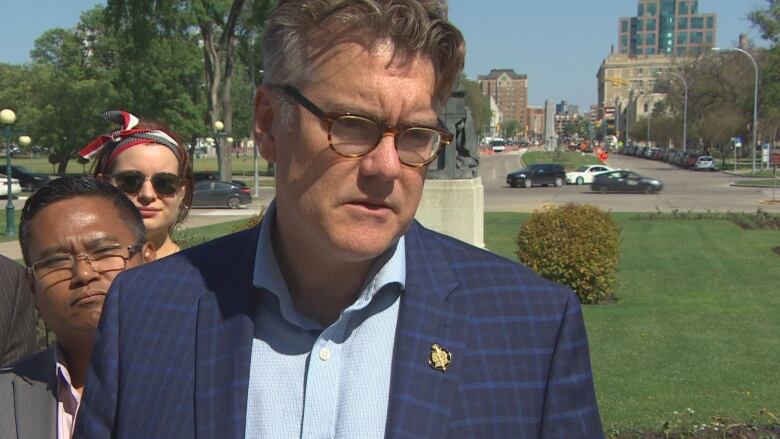Manitoba Liberals propose new provincial police force to fill gaps in rural, Indigenous communities
Service would take over local policing contracts from RCMP, Dougald Lamont says day after election announced

A Liberal government in Manitoba would create a new provincial police force to put more officers in understaffed rural and remote areas, leader Dougald Lamont promises.
"There are too many gaps in policing in Manitoba due to years of budget cuts and it's time to invest in a solution that will workprovincewide," Lamont said at a news conference Thursday, the day after Premier Brian Pallister announced Manitobans will go to the polls on Sept. 10.
Currently, the provincial government contracts out police services in many rural communities to the RCMP, at a cost of $151 million. Lamont estimates the cost of a new provincial police force would be about the same.
The new Manitoba Police Service would take over policing in those communities, while also complementing existing federal RCMP operations andmunicipal and First Nations police services, the Liberal leader said.
It would have specialized Indigenous police units and would helpborder security to stem the flow of drugs, as well as fight organized crime, said Lamont. It would also investigate financial and "white-collar" crime, as well as human trafficking, he said.
'Better bang for our buck'
Policing is often one of the biggest costs for municipalities, said the Liberal leader.
"The Manitoba Police Service, or MPS, will provide a much better bang for our buck," said Lamont. "It's a huge cost for municipalities and I think we could do better by having it shared."
In recent years, some rural community leaders have raised concerns about staff shortages in their local RCMP detachments. Officers covering a large area can sometimes take hours to respond to calls, and positions left vacant due to illness or parental leave often go unfilled, leaving remaining officers to pick up the slack.
Another advantage to having a provincially run police service, Lamont said, would be that local policing issues could be resolved in Manitoba rather than in Ottawa.
"We'd be able to run it here. And that actually would make it more accountable, but also more responsive," he said.
'Risky' proposal: justice minister
Justice Minister Cliff Cullen did not welcome the Liberal proposal.
"The Liberals are making a risky promise to create a provincial police service without doing any consultation with our hard-working police officers or the communities they serve," he said in an email statement.
Cullen touted the Progressive Conservative government's efforts to beef up local policing, including increasing theRCMP staffing complement by 27 officers this year, and spending $2.3 million more on provincial policing this year, bringing their total spending to$205 million.
"The increased funding is dedicated to key initiatives in Manitoba's policing and public safety strategy, which will improve police collaboration and enforcement as we work to combat organized crime and the illicit drug trade," he said.
The Liberals would aim to have the new police service up and running before the end of their first term.
They also promise to flesh out municipal police budgets by directing 25 per cent of provincial cannabis revenue to municipalities, an idea originally proposed by the federal Liberals as part of their legalization plan.
The Manitoba Liberals would also reverse cuts the provincial government made to municipal infrastructure payments, and invest in triage for mental health and addictions services to free up policing resources.












_(720p).jpg)


 OFFICIAL HD MUSIC VIDEO.jpg)
.jpg)



























































































